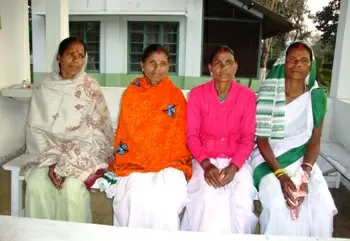Women in Assam’s tea gardens fight alcohol with a sobering effect

25-August-2014
Vol 5 | Issue 34
In the ‘labour lines’ of Behali tea garden in lower Assam’s Sonitpur district, merriment begins as soon as the sun goes down. There is not much by way of entertainment here so ‘making merry’ essentially means indulging the free-flowing, locally-brewed alcohol.
Alcoholism is a truth almost every tea tribe family in Assam is familiar with and yet is unable to escape from its pitfalls. Having borne and seen enough, the womenfolk in these gardens are finally taking matters into their own hands and under the aegis of Mothers’ Club, attempting to, and succeeding in detoxifying their lives.
 |
|
Members of the Behali tea garden Mothers' Club which has gained considerable success in bringing down alcoholism in their garden (Photo: Azera Parveen RahmanWFS)
|
The tea tribe community of Assam comprises mostly migrants hailing from Odisha, West Bengal, Jharkhand and Andhra Pradesh. Their forefathers were brought to the state to work in the tea plantations by the British more than a century back, and they have stayed on ever since.
But despite toiling hard and being the backbone of the flourishing tea industry these workers, most of whom are tribals, live and work in dismal conditions.
Ignorance and illiteracy rank high among the community, and its women and children are particularly a vulnerable lot.
Unhygienic living conditions in their well-demarcated colonies within the tea estates (labour lines), poor socio-economic status, and a very obvious lack of awareness lead to high levels of malnutrition among their children, and an almost universal prevalence of anaemia in women, apart from a host of other health complications such as tuberculosis, gastroenteritis, diarrhoea and typhoid. A high rate of alcohol consumption only adds to their long list of woes.
“After working so hard all day, we want to relax. That’s why we drink ‘paani’ (locally brewed alcohol). It relieves us of all our tension and body aches,” says Budhia Paul, a tea garden labourer, trying to justify his daily intake of liquor. While his wife, Maloti, sympathises with him she does not agree.
According to Maloti and other women of the tea gardens, the daily expenditure on alcohol is Rs 20-30, a sizeable sum considering their daily wage is about Rs 90. Moreover, alcoholics are also notorious for having high records of absenteeism from work, further draining their earning power.
“A pot of brew, about 250 grams, costs Rs 10 and is easily available in the locality,” says Maloti, who is dead against Budhia drinking. “And If I try to reason with him that we can save this money to buy some grocery, or some other household goods and things for the children, he gets violent,” she adds.
Incidentally, it’s not the just the men who are addicted. Although not in as big numbers, but women too are hooked.
In fact, in a sample survey conducted by the DAIPARC, an Assam-based non government organisation, five years back in 64 tea gardens in Sonitpur district, 87 per cent workers above the age of 40 were found to be addicted to alcohol.
Apart from being an economic drain, the repercussions of alcoholism are multilayered. Madan Kishore, medical health assistant of a tea garden hospital says that children of alcoholic parents often drop out of school by Class Five or Six and look for petty work in the garden area to supplement the family income. Not just that, under the influence of the environment at home most children also take up drinking at an early age.
What's more, alcoholism is the main culprit behind a widespread occurrence of liver cirrhosis among the community, say doctors in the garden hospitals, which often proves fatal.
“Be it the extra expenditure, children having to work, or an illness, the burden of alcoholism usually falls on the shoulders of the women who are already struggling to make ends meet. For that reason, we decided to do something about it at the Mothers’ Club,” reveals Anita Lohar of Behali.
The Mothers’ Club’s strategy to deal with this serious issue is to spread awareness door-to-door. Originally a Korean concept, these clubs, consisting of 12 to 15 women, were formed in member tea estates of the Assam Branch of Indian Tea Association (ABITA) in 1999-2000.
“Initially when we used to visit the lines, especially to those spots where liquor was sold, to talk to the men about the ill effects of drinking, they used to call us names and shoo us off,” recalls Lohar.
Ashamboti Tatti of the same club says, “It’s been a few years since we have been persevering, so things are changing and alcoholism has come down in families. You don’t get liquor as easily in the lines as you used to. Moreover, the women have become more confident in putting forth their opinion,” she elaborates.
While a lot more needs to be done, a wave of awareness is spreading, albeit slowly, on the importance of education in the community, which in turn has had a positive impact on their living condition.
Anita Aind, a young girl from the community is doing her B.Ed. (Bachelors in Education) from the nearby town of Tezpur while both her parents continue to work as tea garden labourers.
“I think illiteracy and alcoholism is interlinked, and alcoholism is the biggest problem in my community. Now that I understand this problem, I have been able to explain it to my family and my neighbours who take my word seriously and refrain from it,” Aind points out.
Agrees Nazim Ahmed of the DAIPARC, “The community’s new generation is more conscious, more literate. Earlier, the drop-out rate before Class 10 was high, now more children are regular. Parents too are taking interest in letting their kids continue their studies after passing out of the primary school in the tea estates.”
“In our monthly meetings we discuss a particular theme, such as nutrition, hygiene, or which diseases to look out for this month, and after discussions with the doctor in the hospital, go to the lines and talk to the people. We don’t get any added incentive for our work - just a uniform (a green bordered sari) - but the fact that our work is positively impacting our own community and children, in particular, is a reward in itself,” concludes Tatti, with satisfaction.
(Azera Parveen Rahman is a freelance journalist. This story is part of her work supported by the National Foundation of India through a National Media Fellowship.) - Women's Feature Service














